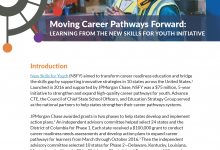Career exploration occurs on a spectrum, and opportunities in the middle grades can take many forms, including job shadowing, simulated learning experiences, and classroom visits from business and industry. Specifically, work-based learning opportunities equip students with real-world experience that helps them to develop employability skills, such as interpersonal and communication skills, and allows them to apply academic skills to real-world situations.
In 2015, recognizing the importance of work-based learning in producing career-ready students, Nebraska’s Governor launched the Nebraska Developing Youth Talent Initiative (NDYTI), a program that connects seventh and eighth graders to learning opportunities in the manufacturing and information technology (IT) industries in Nebraska. Through NDYTI, the Nebraska Department of Economic Development administers up to $250,000 total to a minimum of two projects. Businesses in the manufacturing and IT sectors are the lead applicants for the grants and must partner with a local public school to develop a program or project. One of the two projects must serve a community that has a population of fewer than 100,000 people to ensure that rural communities benefit from this initiative.
Grant recipients tend to implement one of two models at local public schools: a mobile trailer or a career development rotational program. In the mobile trailer model, employers purchase a trailer and equip it with equipment relevant to their sector, such as computers or manufacturing equipment. The trailer travels to multiple middle schools, where students use the equipment and learn more about the sector from the employer(s). The middle schools, in cooperation with the businesses, develop a curriculum that integrates the use of the equipment in the trailer. This model is a particularly strategic way for rural students to learn about career options that may not be available in their specific community.
In other cases, grant recipients help fund career development rotational programs with the goal of rejuvenating exploratory programs in the middle schools and allowing students to experience hands-on opportunities to explore the skill sets needed in the manufacturing and IT industries. Some grants are used to purchase relevant equipment with input from the partner employer to develop exploratory programs or school enterprises. Students in these programs learn about the particular industry or sector through the use of the equipment, mentoring from the partner employer, and accompanying tours of the employer’s facilities or workspace. Other uses of the grants include specialized training for middle school teachers to equip them to better prepare students for and excite students about further career exploration in high school.
Policy in Action
Since its inception, there have been at least nine grant recipients, directing hands-on learning experiences for thousands of students in more than 20 schools. One critical outcome of NDYTI is the increase in and strengthening of partnerships among employers, schools and students. For instance, one program required more than 100 hours of direct coordination between business and school partners to establish a program consisting of a science, technology, engineering and mathematics (STEM) mobile trailer, virtual reality video and manufacturing curriculum. The preliminary result from this collaboration was that 100 percent of program participants “agreed” or “strongly agreed” that they have a strong knowledge of careers in manufacturing and an interest in a manufacturing career by the end of the program, an increase from 69.23 percent and 53.84 percent respectively. Another program developed a manufacturing curriculum and increased industry involvement in the classroom from zero hours in the previous year to 35 hours in the program implementation year. Additionally, students increased their understanding of the importance of critical “soft or life skills.” All grant recipients working within career development rotational programs reported this outcome. As of July 2019, the Nebraska Department of Economic Development estimates that NDYTI grants have introduced 7,000 Nebraska students to the maunfactoring, IT and STEM fields across more than two dozen school districts.
Related Links
Website: Nebraska Developing Youth Talent Initative
Resource: CTE on the Frontier: Connecting Rural Learners with the World of Work
Resource: Expanding Middle School CTE to Promote Lifelong Learner Success
Evaluation: 2016-2017 Final Evaluation: Nebraska Developing Youth Talent Initative
Resource: Developing Youth Talent Initative Overview
Press Release: 2019 Developing Youth Talent Initative Grant Recipients
Last Updated: September 2019






